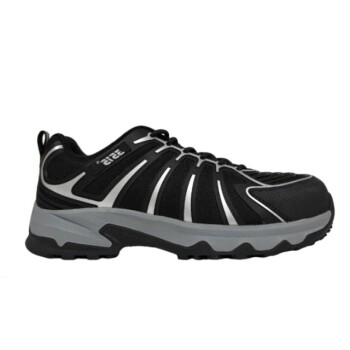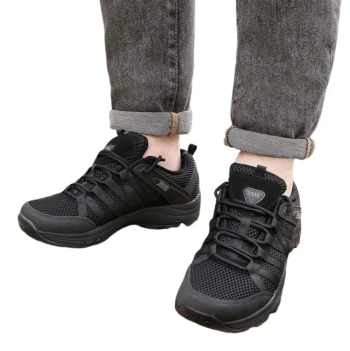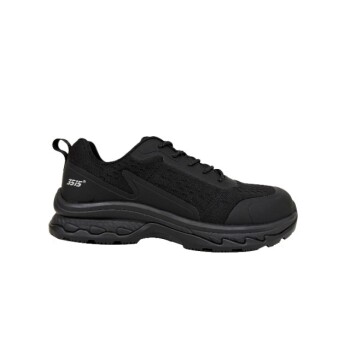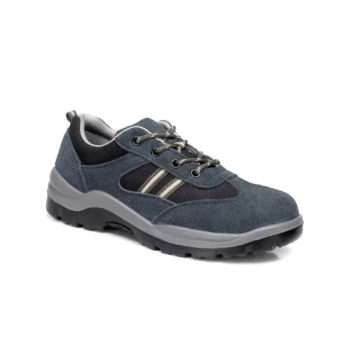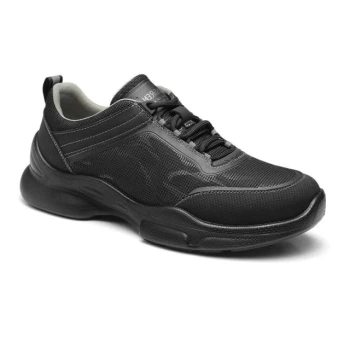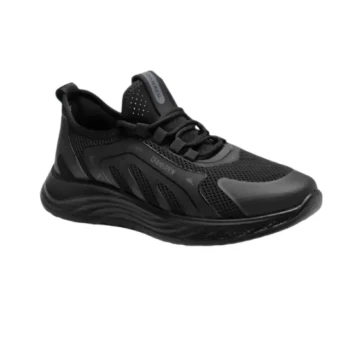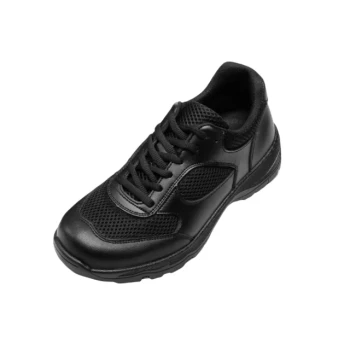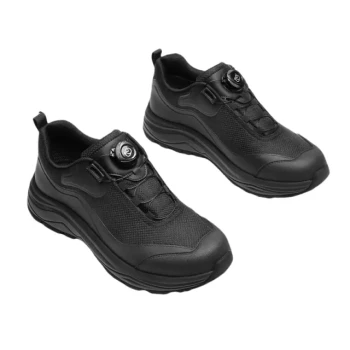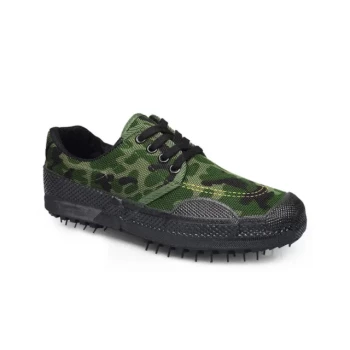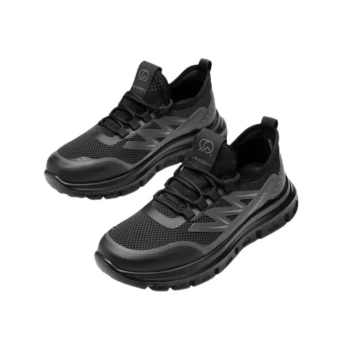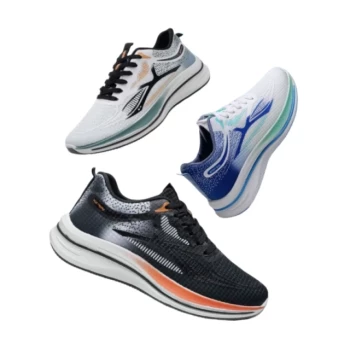The most important considerations when selecting work shoes are achieving a perfect fit, matching the shoe's safety features to your specific job hazards, and ensuring the materials and construction are suited for your daily environment. Unlike casual footwear, a work shoe is a critical piece of personal protective equipment that must perform from the moment you put it on.
The central takeaway is this: a work shoe cannot be judged on a single feature. The right choice is a calculated balance between your personal anatomy (foot shape, gait) and the non-negotiable demands of your work environment.
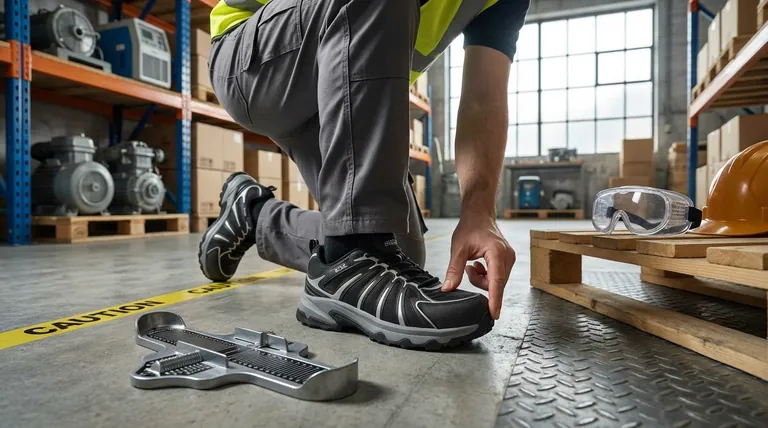
Foundational Priority: Fit and Personal Comfort
Your first consideration must always be fit. An ill-fitting work shoe not only causes discomfort but can also compromise its safety features and lead to long-term foot problems.
Why "Breaking In" is a Myth for Work Shoes
Unlike leather dress shoes, safety footwear is built with reinforced materials that do not stretch or conform over time. The fit you feel in the store is the fit you will have for the life of the shoe.
An improper fit causes immediate discomfort and can stress the shoe's structure, affecting your gait and overall alignment.
Accounting for Your Unique Foot Shape
Every foot is different. You must consider your specific arch type—whether you have flat feet, high arches, or a neutral arch—to ensure proper support.
Conditions like bunions also require extra consideration for width and toe box shape. Many work shoes have minimal arch support, so you may need to ensure there is enough room for specialized insoles.
The Importance of a Proper Fitting
Whenever possible, try on shoes in person, preferably at the end of the day when your feet are slightly swollen. Measure both feet, as they are often different sizes.
Ensure there is adequate width and about a thumb's width of space between your longest toe and the end of the shoe. Wear the type of socks you would typically wear to work to get the most accurate assessment.
Matching the Shoe to the Work Environment
Once fit is established, the shoe must be appropriate for the specific tasks and hazards you face daily.
Identifying Your Workplace Hazards
The shoe's protection class must match your job's risks. This is non-negotiable.
Key safety features include:
- Safety Toes: Protect against impact and compression.
- Puncture Resistance: Protects the sole from sharp objects like nails.
- Electrical Hazard (EH): Insulates you from electrical circuits.
- Slip Resistance: Crucial for wet, oily, or smooth surfaces.
- Chemical or Oil Resistance: Prevents degradation of the sole in industrial environments.
- Heat Resistance: Necessary for high-temperature work areas.
The Critical Role of the Outsole
Think of the outsole as the tire tread of your shoe. Its material and pattern determine its performance on different surfaces.
A quality sole provides traction, stability, and durability. The specific demands of your job—whether it's on slick kitchen floors or abrasive construction sites—will dictate the type of outsole you need.
Considering the Upper Materials
The upper part of the shoe must balance protection, durability, and comfort.
Waterproof or water-resistant materials are essential for wet environments. In hot conditions, breathable fabrics like mesh prevent sweating and discomfort. Durability is also key, so look for reinforced stitching and high-quality construction.
Understanding the Trade-offs
Choosing the perfect work shoe often involves balancing competing features. Understanding these compromises is key to making an informed decision.
Safety vs. Comfort
The most protective features, like a steel safety toe or a puncture-proof plate, often add weight and rigidity. This can make shoes less comfortable for jobs requiring constant movement, like warehousing or delivery.
Durability vs. Weight
Heavy-duty leather shoes offer maximum durability but can be heavy and hot. Modern synthetic materials may offer a lighter, more breathable option but might not withstand the same level of abrasion over time.
Waterproofing vs. Breathability
A fully waterproof membrane is excellent at keeping water out, but it can also trap sweat and heat inside. In contrast, a highly breathable mesh upper will keep your feet cool and dry from sweat but offers little protection from external moisture.
Making the Right Choice for Your Goal
Use your primary need to guide your final decision.
- If your primary focus is safety in an industrial setting: Prioritize the required safety rating (e.g., safety toe, EH, puncture resistance) above all else.
- If your primary focus is comfort for long hours on your feet: Concentrate on achieving a perfect fit for your foot type, excellent arch support, and lightweight construction.
- If your primary focus is navigating slippery or wet environments: Your non-negotiable features are a certified slip-resistant outsole and appropriate water-resistant or waterproof uppers.
- If your primary focus is a professional office setting: Seek a balance of classic style with comfort features like cushioned insoles, adequate arch support, and non-slip soles for polished floors.
Ultimately, investing in the right work shoe is a direct investment in your daily safety, comfort, and well-being.
Summary Table:
| Key Consideration | Priority Factors |
|---|---|
| Fit & Comfort | Arch type, foot width, room for toes, no 'break-in' needed |
| Safety Features | Safety toes, slip/puncture resistance, EH rating, chemical/heat resistance |
| Work Environment | Outsole traction, upper material (waterproof/breathable), durability vs. weight |
| Primary Goal | Industrial safety, all-day comfort, slip resistance, or professional style |
Ready to find the perfect work shoe for your team?
As a large-scale manufacturer, 3515 produces a comprehensive range of safety and occupational footwear for distributors, brand owners, and bulk clients. We can help you source the right shoes that meet specific safety standards, ensure all-day comfort for your workforce, and withstand the demands of your industry.
Contact us today to discuss your bulk footwear needs and benefit from our extensive production capabilities!
Visual Guide
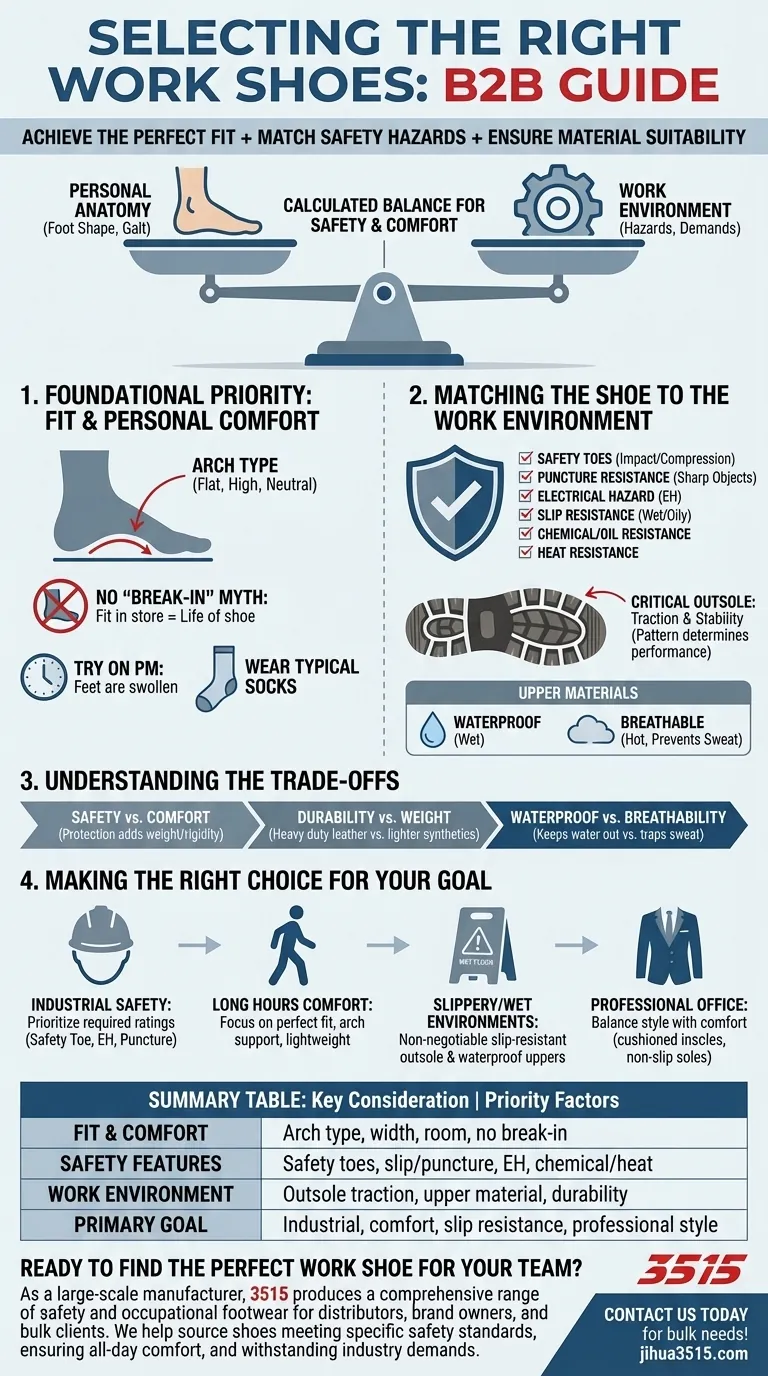
Related Products
- Premium KPU Athletic Safety Shoes for Wholesale
- Lightweight Breathable Training Shoes for Wholesale & Custom OEM Manufacturing
- Premium Lightweight Safety Shoes for Wholesale & Bulk Orders
- Custom Safety Shoe Manufacturer for Wholesale & OEM Brands
- Wholesale Breathable Training Shoes Custom Athletic Footwear Manufacturer
People Also Ask
- What types of workplace hazards require protective footwear? Essential Guide for Workplace Safety
- What materials are used in the construction of these boots? A Guide to Velour Leather, Textile & PU Soles
- Why is slip resistance important in safety footwear? Prevent Costly Workplace Slips and Falls
- What do the markings on ASTM-compliant safety shoes indicate? Decode the Safety Labels for Maximum Protection
- What are the EN ISO 20345 norms for safety shoes? A Guide to Choosing the Right Protection
